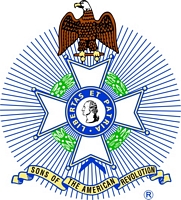Name of Patriot: James Critchlow NSSAR Patriot # P-141169
Submitted by: Larry A. Divins
James Critchlow/Crutchlow was born in 1755 at West Pennsborough Twp., Cumberland County, Pennsylvania of parents David Critchlow and Martha Leech. James was a farmer who migrated from Cumberland County to Westmoreland County and then to Butler County, all within the State of Pennsylvania. He married Mary Leech on 24 July 1778 at the home of Robert Fleming on Sewickley Creek in Westmoreland County, probably in Hempfield Township, and they raised eight children together. James died 2 Mar 1834 at the age of 78 and Mary died in 1841 at the age of 79. James is buried at the Middlesex Presbyterian Church Cemetery in Butler, PA. His grave is marked by a Revolutionary War medallion and flag.
James Critchlow enlisted 11 Aug 1776 as a private for a term of three years in the newly formed 8th Pennsylvania Regiment under the command of Col. Mackay for the purpose of defending the frontier. James was initially in Captain Moses Carson’s Company. In November, 1776, the Regiment was ordered to join up with the Continental Army in New Jersey and consequently had to march across Pennsylvania in the middle of winter. Col. Mackay died during the march and was temporarily replaced by Maj. Richard Butler. James Critchlow’s first action was the Battle of Bound Brook. Shortly after the battle, Col. Daniel Brodhead took command of the Regiment, but at about the same time (May 1777), James was drafted into Col. Daniel Morgan’s Corps of expert riflemen (1st Continental Regiment). He served under Lt. John Findley in Capt. Knox’s Company for better than one year. He participated in all the Saratoga battles, wherein Morgan’s Rifles played a decisive role in this turning point victory. He continued serving in Morgan’s Rifles in their next action near Philadelphia in the Battle of White Marsh, prior to wintering at Valley Forge. James was re-assigned to the 8th Pennsylvania Regiment before its departure from Valley Forge in June 1778 to return to Ft. Pitt. During the return trip, James apparently had leave long enough to get married. He remained with the Regiment for a little over another year and participated in the Regiment’s work to build forts and roads on the western frontier. His final participation in the Regiment was the August-September, 1779 expedition up the Allegheny River in support of the Sullivan-Clinton Campaign against the Indians of Western New York. James received an honorable discharge from Lt. Col. Bayard in September 1779. His pension application was W6771 and he was allowed three years of combined service in both Pennsylvania and Virginia Regiments.
- Log in to post comments
